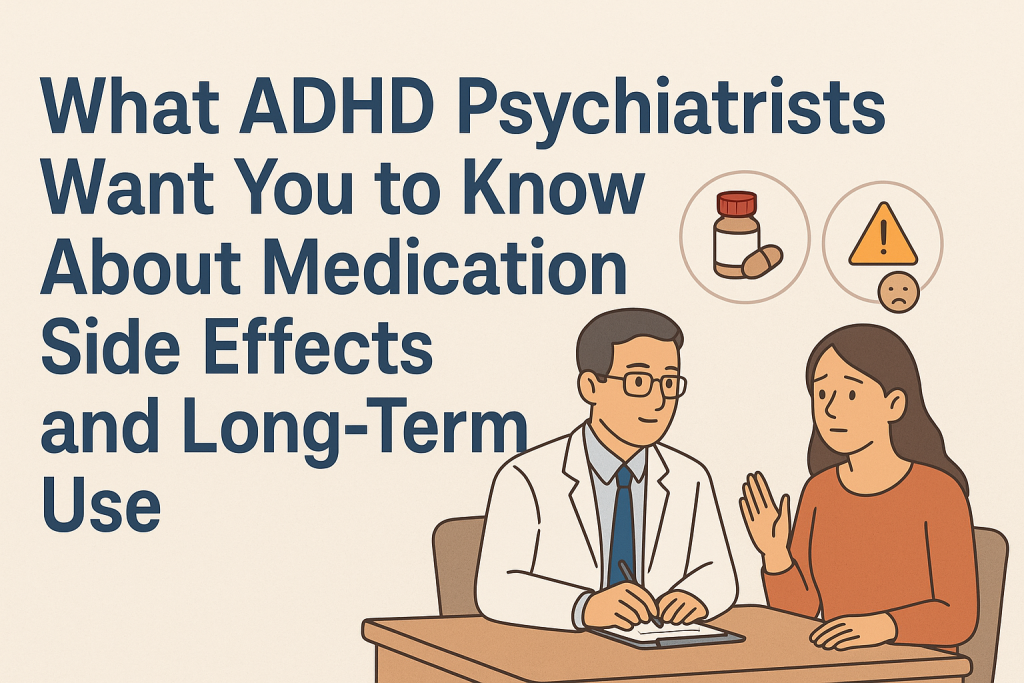Attention-Deficit/Hyperactivity Disorder (ADHD) affects millions of children and adults worldwide. While therapy and behavioral interventions play an essential role in managing ADHD, medication often remains one of the most effective treatments. However, patients and parents frequently have concerns about the side effects and long-term impacts of these drugs.
According to every qualified ADHD psychiatrist, understanding how ADHD medication works and what to expect can help you make informed choices that balance symptom relief with overall well-being. Let’s explore what psychiatrists want patients to know about the realities of ADHD medications, side effects, and their long-term safety.
The Basics: How ADHD Medications Work
ADHD medications generally fall into two categories: stimulants and non-stimulants.
1. Stimulant Medications
Stimulants like methylphenidate (Ritalin, Concerta) and amphetamine-based drugs (Adderall, Vyvanse) are the most commonly prescribed. These medications increase the levels of dopamine and norepinephrine in the brain neurotransmitters associated with attention, motivation, and focus.
For many people, stimulants provide significant improvement within hours of taking them. But they can also come with side effects that vary from person to person.
2. Non-Stimulant Medications
For those who cannot tolerate stimulants or have certain medical conditions, non-stimulants such as atomoxetine (Strattera), guanfacine (Intuniv), or clonidine (Kapvay) may be prescribed. These drugs work differently, often taking several weeks to show their full effects, but tend to have a lower risk of misuse or dependency.
An experienced ADHD psychiatrist can help determine which type of medication best suits a patient’s unique symptoms, lifestyle, and health profile.
Common Side Effects: What You Might Experience
All medications can cause side effects, and ADHD drugs are no exception. However, understanding them helps manage expectations and prevent unnecessary anxiety.
1. Appetite Changes
One of the most reported side effects, especially with stimulants, is reduced appetite. Some children or adults may experience weight loss or delayed growth if this persists. Psychiatrists often recommend adjusting meal timing or dosage to minimize this impact.
2. Sleep Disturbances
Difficulty falling asleep or staying asleep can occur when ADHD medications are taken too late in the day. Simple strategies such as earlier dosing or switching to a shorter-acting formulation can help reduce insomnia.
3. Mood Changes or Irritability
Occasionally, medications may cause irritability, anxiety, or mood swings, particularly as the drug wears off (“rebound effect”). Monitoring emotional changes and reporting them to your psychiatrist ensures timely adjustments.
4. Increased Heart Rate or Blood Pressure
Stimulant medications can slightly raise heart rate and blood pressure. For most healthy individuals, this isn’t dangerous, but regular checkups help ensure cardiovascular safety especially in adults with pre-existing conditions.
5. Stomach Aches and Headaches
Mild digestive issues or headaches are fairly common in the first few weeks of treatment. These usually fade as the body adjusts. Staying hydrated and eating before taking medication often reduces discomfort.
The Truth About Long-Term Use
One of the biggest questions patients ask their ADHD psychiatrist is: “Will I have to take medication forever?”
The answer depends on individual needs, symptom severity, and how well other coping strategies are developed. But here’s what research and psychiatric experts consistently emphasize:
1. Long-Term Use Can Be Safe with Proper Monitoring
Decades of studies have shown that stimulant and non-stimulant ADHD medications are safe for long-term use under medical supervision. Regular follow-ups with your psychiatrist ensure dosages remain appropriate and any side effects are addressed promptly.
2. Tolerance and Dependence Are Rare
While stimulants are controlled substances, therapeutic use does not typically lead to addiction. When taken as prescribed, these drugs help restore normal brain function rather than producing a “high.” Still, your psychiatrist will monitor dosage levels to prevent misuse.
3. Medication Doesn’t Replace Coping Skills
ADHD medication improves focus, organization, and impulse control but it doesn’t teach life skills. Long-term management often includes behavioral therapy, lifestyle adjustments, and environmental support to create lasting progress beyond medication alone.
4. Periodic Re-Evaluation Is Important
An ADHD psychiatrist may suggest “medication holidays” (short breaks under supervision) to assess how you function without medication or to minimize side effects. This is particularly common in children, as their brains and bodies continue to develop.
Debunking Myths About ADHD Medication
Despite strong clinical evidence supporting ADHD medications, several myths still cause hesitation among patients and parents. Let’s address the most common misconceptions.
Myth 1: ADHD Medications Are a “Quick Fix”
Medication is not a cure it’s a management tool. While it helps control symptoms, long-term success comes from combining medication with counseling, lifestyle adjustments, and support from family or educators.
Myth 2: Taking Stimulants Leads to Addiction
When monitored by a psychiatrist and taken at prescribed doses, ADHD medications do not cause addiction. In fact, studies show that proper treatment can reduce the risk of substance misuse later in life by improving impulse control and emotional regulation.
Myth 3: ADHD Medication Alters Personality
ADHD drugs do not change who you are. They simply enhance focus and reduce distractibility. If someone feels “flat” or unlike themselves, it’s a sign the dosage or medication type needs adjustment not that medication itself is harmful.
Myth 4: Children Shouldn’t Take ADHD Medications
Evidence strongly supports the use of medication in children when symptoms interfere with learning, relationships, or daily functioning. Pediatric psychiatrists tailor dosages carefully to ensure safety and developmental support.
How ADHD Psychiatrists Monitor and Manage Side Effects
The role of an ADHD psychiatrist goes beyond writing prescriptions. These specialists continuously evaluate your response to treatment and make necessary adjustments.
1. Comprehensive Assessment
Before starting medication, your psychiatrist conducts a detailed evaluation covering medical history, coexisting conditions (like anxiety or depression), and lifestyle factors that might affect treatment.
2. Gradual Dosage Titration
Medications are usually started at a low dose and increased gradually. This “titration” process helps identify the minimum effective dose while reducing side effect risks.
3. Regular Follow-Up Appointments
Psychiatrists recommend check-ins especially during the first few months to track progress, discuss concerns, and ensure the medication continues to align with your goals.
4. Collaboration with Other Professionals
An ADHD psychiatrist may work with psychologists, teachers, or occupational therapists to create a multidisciplinary care plan. This integrated approach ensures consistent support in every area of life.
Supporting Long-Term Success Beyond Medication
While medication plays a vital role, it’s only one part of a sustainable ADHD treatment plan. Psychiatrists often emphasize these complementary strategies:
1. Behavioral Therapy
Cognitive Behavioral Therapy (CBT) helps individuals develop coping mechanisms, improve emotional regulation, and replace negative thinking patterns with healthier responses.
2. Lifestyle Modifications
Regular exercise, balanced nutrition, quality sleep, and reduced screen time can significantly enhance medication effectiveness and overall mental health.
3. Organizational Skills Training
Time management tools, planners, reminders, and structured routines can help maintain consistency in daily activities.
4. Supportive Environments
Encouragement from family, teachers, and employers can make a tremendous difference. ADHD is not just a medical condition it’s a shared experience that benefits from understanding and patience.
When to Talk to Your ADHD Psychiatrist
If you notice new or worsening side effects, mood changes, or any health concerns, it’s essential to reach out to your psychiatrist promptly. Adjustments in medication type, dosage, or timing can often resolve issues quickly.
Remember: open communication is key. Your psychiatrist’s goal is not only to control ADHD symptoms but also to ensure your treatment enhances your overall quality of life.
Expertminds: Empowering You Toward Informed Mental Health Choices
At Expertminds, we believe that understanding your treatment is just as important as receiving it. Our team of qualified professionals provides compassionate, evidence-based guidance for individuals seeking support from an ADHD psychiatrist.
Whether you’re exploring medication for the first time or evaluating long-term options, the right expertise and personalized care can make all the difference in your mental health journey.
Final Thoughts
Medication can be a life-changing tool for people with ADHD, helping them focus, stay organized, and reach their potential. However, it’s not a one-size-fits-all solution and it’s never meant to replace holistic care.
By working closely with your ADHD psychiatrist, understanding possible side effects, and combining medication with supportive therapies, you can achieve long-term balance and control.
ADHD doesn’t define you and with the right knowledge and professional guidance, you can manage it confidently for years to come.







